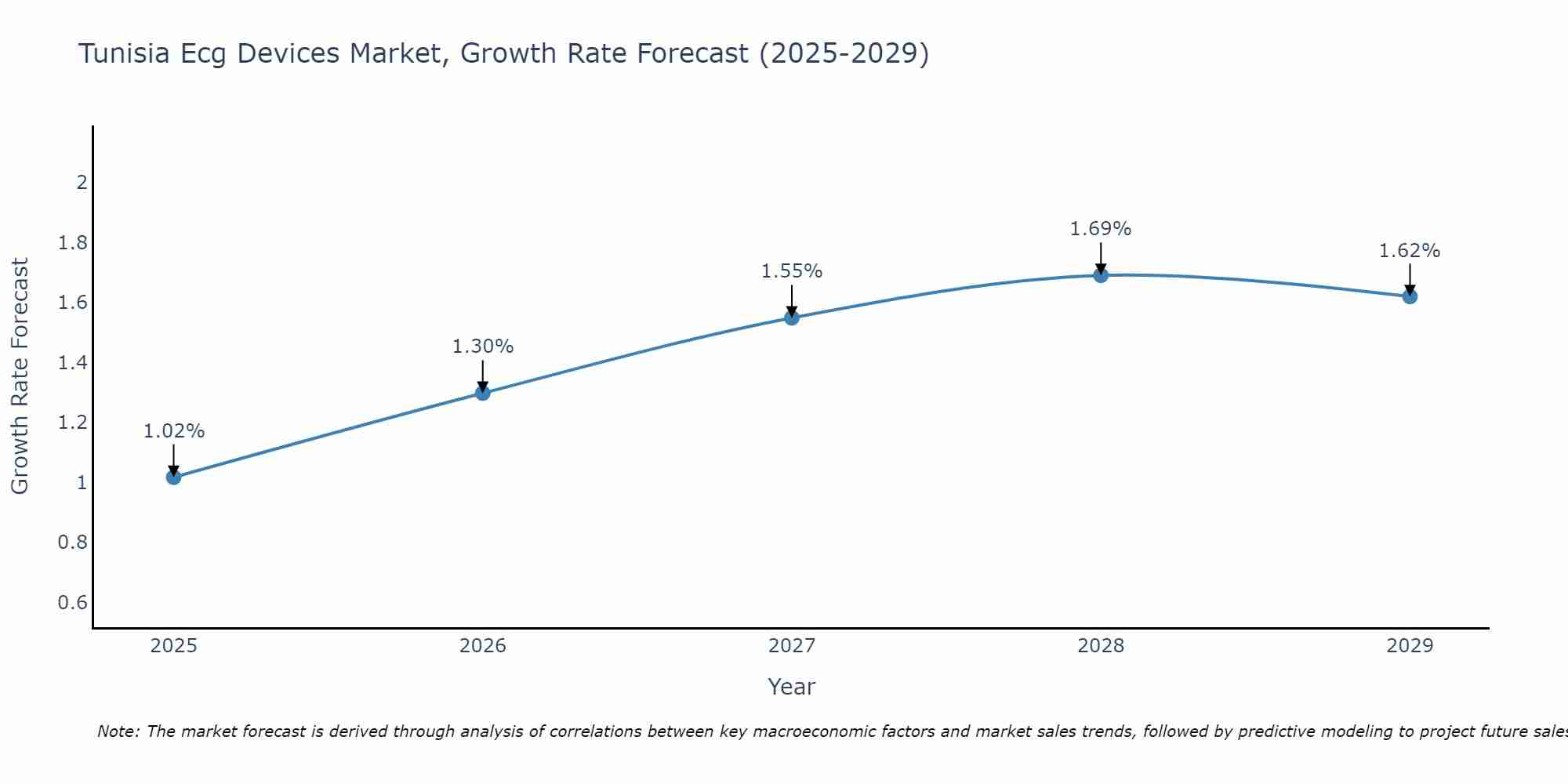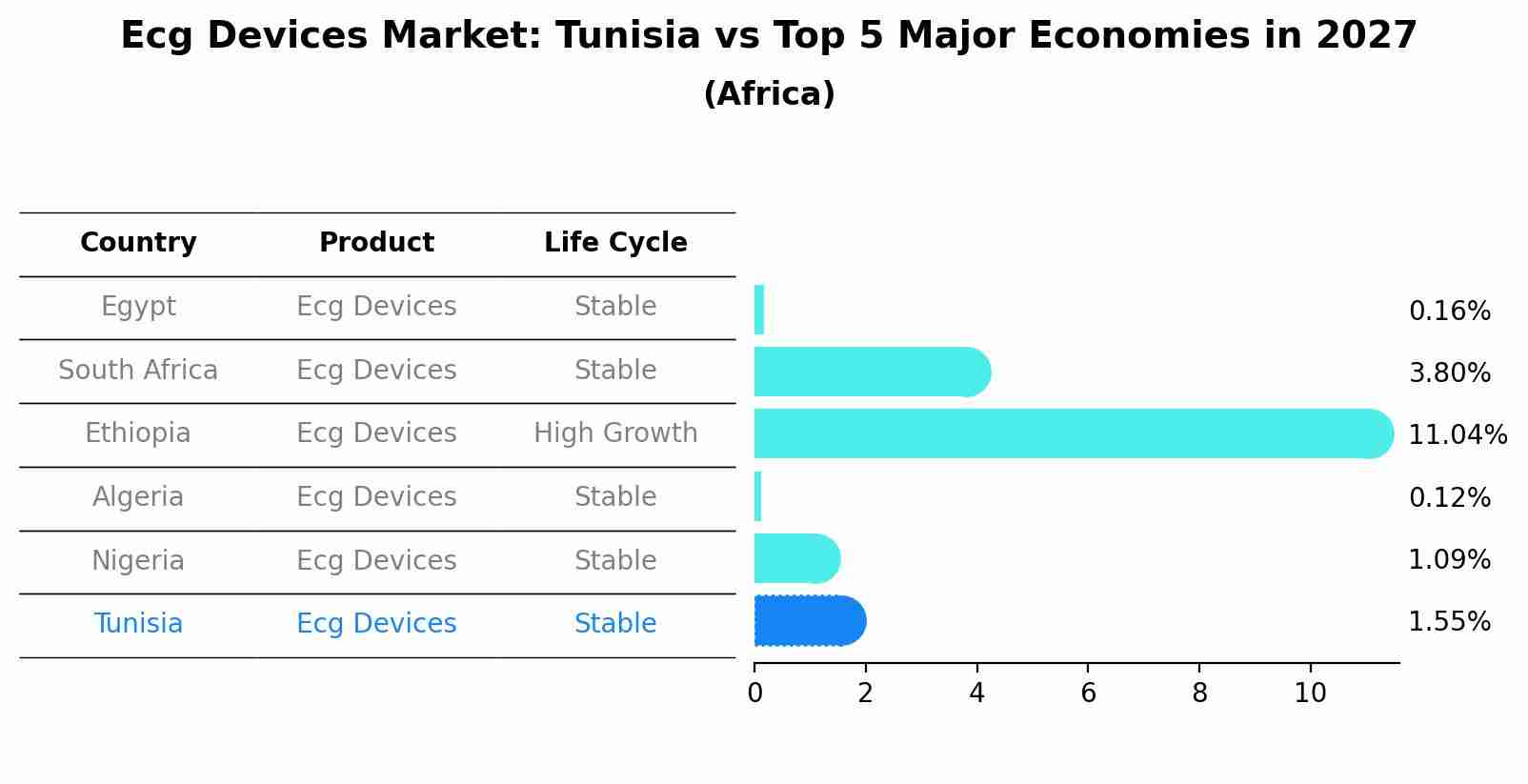Tunisia Ecg Devices Market (2025-2031) Outlook | Revenue, Trends, Value, Analysis, Size, Growth, Industry, Share, Forecast, Companies
| Product Code: ETC363414 | Publication Date: Aug 2022 | Updated Date: Aug 2025 | Product Type: Market Research Report | |
| Publisher: 6Wresearch | Author: Summon Dutta | No. of Pages: 75 | No. of Figures: 35 | No. of Tables: 20 |
Tunisia Ecg Devices Market Size Growth Rate
The Tunisia Ecg Devices Market is projected to witness mixed growth rate patterns during 2025 to 2029. Growth accelerates to 1.69% in 2028, following an initial rate of 1.02%, before easing to 1.62% at the end of the period.

Ecg Devices Market: Tunisia vs Top 5 Major Economies in 2027 (Africa)
In the Africa region, the Ecg Devices market in Tunisia is projected to expand at a stable growth rate of 1.55% by 2027. The largest economy is Egypt, followed by South Africa, Ethiopia, Algeria and Nigeria.

Tunisia Ecg Devices Market Synopsis
The Tunisia ECG devices market is experiencing steady growth, driven by increasing prevalence of cardiovascular diseases and a growing elderly population. The market is characterized by a rising demand for portable and wireless ECG devices, as well as advancements in technology leading to more accurate and user-friendly products. Key players in the market are focusing on product innovation and strategic partnerships to expand their market presence. Hospitals and clinics are the major end-users of ECG devices in Tunisia, with a growing trend towards home monitoring devices for remote patient care. Government initiatives to improve healthcare infrastructure and rising awareness about preventive healthcare measures are also contributing to the market growth. Overall, the Tunisia ECG devices market is poised for further expansion in the coming years.
Tunisia Ecg Devices Market Trends
The Tunisia ECG devices market is experiencing a growing demand for portable and wireless ECG devices, driven by the increasing prevalence of cardiovascular diseases and the need for convenient monitoring solutions. Health professionals and patients are increasingly seeking compact and user-friendly ECG devices that offer real-time data transmission for remote monitoring and telemedicine applications. Additionally, there is a rising adoption of advanced technologies such as cloud-based ECG systems and mobile ECG apps, which enable seamless data management and analysis. The market is also witnessing a trend towards integrated ECG devices that combine ECG monitoring with other health parameters tracking capabilities. Overall, the Tunisia ECG devices market is evolving towards more innovative and patient-centric solutions to meet the demands of modern healthcare practices.
Tunisia Ecg Devices Market Challenges
In the Tunisia ECG devices market, some of the key challenges include limited awareness and access to advanced healthcare technologies in remote areas, leading to uneven distribution of ECG devices across the country. Additionally, high costs associated with acquiring and maintaining ECG equipment can pose a barrier for smaller healthcare facilities and clinics. Regulatory hurdles and compliance requirements may also impact the market growth, as adherence to standards and certifications can be time-consuming and expensive for manufacturers. Furthermore, the presence of counterfeit or substandard ECG devices in the market poses a risk to patient safety and undermines the credibility of legitimate suppliers. Addressing these challenges will be crucial for fostering the growth of the ECG devices market in Tunisia and ensuring quality healthcare services for all segments of the population.
Tunisia Ecg Devices Market Investment Opportunities
The Tunisia ECG devices market presents enticing investment opportunities driven by the increasing prevalence of cardiovascular diseases and the growing adoption of advanced healthcare technologies in the country. With a rising emphasis on early disease detection and management, there is a growing demand for ECG devices for both diagnostic and monitoring purposes. Investors can explore opportunities in the development and distribution of portable and wireless ECG devices, as well as software solutions for remote monitoring and telemedicine applications. Collaborating with local healthcare providers and institutions to enhance access to ECG services in underserved regions can also be a strategic investment approach. Overall, the Tunisia ECG devices market offers potential for growth and innovation, making it an attractive sector for investors looking to capitalize on the expanding healthcare landscape in the region.
Jordan Agar Market Government Policies
In Tunisia, the government has implemented various policies related to medical devices, including ECG devices, to ensure safety and quality standards in the market. The Ministry of Health regulates the registration and approval process for medical devices, including ECG devices, to guarantee their efficacy and safety for patients. Additionally, the government has established import regulations and quality control measures to monitor the distribution and usage of ECG devices in the country. Furthermore, there are ongoing efforts to promote local manufacturing of medical devices, which may impact the ECG devices market by encouraging domestic production and reducing reliance on imports. Overall, these policies aim to enhance the accessibility and quality of ECG devices in Tunisia`s healthcare system while ensuring compliance with international standards.
Tunisia Ecg Devices Market Future Outlook
The Tunisia ECG devices market is expected to show steady growth in the coming years, driven by factors such as increasing prevalence of cardiovascular diseases, growing awareness about the importance of early diagnosis, and advancements in technology. The adoption of portable and wireless ECG devices is also likely to contribute to market expansion, as they offer convenience and remote monitoring capabilities. Additionally, government initiatives aimed at improving healthcare infrastructure and services are expected to further fuel market growth. However, challenges such as limited access to healthcare in rural areas and economic constraints may hinder market development to some extent. Overall, the Tunisia ECG devices market is poised for growth, with opportunities for market players to innovate and expand their product offerings to meet the evolving needs of healthcare providers and patients.
Key Highlights of the Report:
- Tunisia Ecg Devices Market Outlook
- Market Size of Tunisia Ecg Devices Market, 2024
- Forecast of Tunisia Ecg Devices Market, 2031
- Historical Data and Forecast of Tunisia Ecg Devices Revenues & Volume for the Period 2021 - 2031
- Tunisia Ecg Devices Market Trend Evolution
- Tunisia Ecg Devices Market Drivers and Challenges
- Tunisia Ecg Devices Price Trends
- Tunisia Ecg Devices Porter's Five Forces
- Tunisia Ecg Devices Industry Life Cycle
- Historical Data and Forecast of Tunisia Ecg Devices Market Revenues & Volume By Product Type for the Period 2021 - 2031
- Historical Data and Forecast of Tunisia Ecg Devices Market Revenues & Volume By ECG Resting System for the Period 2021 - 2031
- Historical Data and Forecast of Tunisia Ecg Devices Market Revenues & Volume By ECG Holter Monitoring System for the Period 2021 - 2031
- Historical Data and Forecast of Tunisia Ecg Devices Market Revenues & Volume By ECG Stress Testing System for the Period 2021 - 2031
- Historical Data and Forecast of Tunisia Ecg Devices Market Revenues & Volume By Cardiopulmonary Stress Testing System for the Period 2021 - 2031
- Historical Data and Forecast of Tunisia Ecg Devices Market Revenues & Volume By End User for the Period 2021 - 2031
- Historical Data and Forecast of Tunisia Ecg Devices Market Revenues & Volume By Hospitals for the Period 2021 - 2031
- Historical Data and Forecast of Tunisia Ecg Devices Market Revenues & Volume By Diagnostic centre for the Period 2021 - 2031
- Historical Data and Forecast of Tunisia Ecg Devices Market Revenues & Volume By Clinics for the Period 2021 - 2031
- Historical Data and Forecast of Tunisia Ecg Devices Market Revenues & Volume By Ambulatory Surgical Centre for the Period 2021 - 2031
- Tunisia Ecg Devices Import Export Trade Statistics
- Market Opportunity Assessment By Product Type
- Market Opportunity Assessment By End User
- Tunisia Ecg Devices Top Companies Market Share
- Tunisia Ecg Devices Competitive Benchmarking By Technical and Operational Parameters
- Tunisia Ecg Devices Company Profiles
- Tunisia Ecg Devices Key Strategic Recommendations
Frequently Asked Questions About the Market Study (FAQs):
- Single User License$ 1,995
- Department License$ 2,400
- Site License$ 3,120
- Global License$ 3,795
Search
Thought Leadership and Analyst Meet
Our Clients
Related Reports
- Afghanistan Apparel Market (2026-2032) | Growth, Outlook, Industry, Segmentation, Forecast, Size, Companies, Trends, Value, Share, Analysis & Revenue
- Canada Oil and Gas Market (2026-2032) | Share, Segmentation, Value, Industry, Trends, Forecast, Analysis, Size & Revenue, Growth, Competitive Landscape, Outlook, Companies
- Germany Breakfast Food Market (2026-2032) | Industry, Share, Growth, Size, Companies, Value, Analysis, Revenue, Trends, Forecast & Outlook
- Australia Briquette Market (2025-2031) | Growth, Size, Revenue, Forecast, Analysis, Trends, Value, Share, Industry & Companies
- Vietnam System Integrator Market (2025-2031) | Size, Companies, Analysis, Industry, Value, Forecast, Growth, Trends, Revenue & Share
- ASEAN and Thailand Brain Health Supplements Market (2025-2031) | Strategy, Consumer Insights, Analysis, Investment Trends, Opportunities, Growth, Size, Share, Industry, Revenue, Segments, Value, Segmentation, Supply, Forecast, Restraints, Outlook, Competition, Drivers, Trends, Demand, Pricing Analysis, Competitive, Strategic Insights, Companies, Challenges
- ASEAN Bearings Market (2025-2031) | Strategy, Consumer Insights, Analysis, Investment Trends, Opportunities, Growth, Size, Share, Industry, Revenue, Segments, Value, Segmentation, Supply, Forecast, Restraints, Outlook, Competition, Drivers, Trends, Demand, Pricing Analysis, Competitive, Strategic Insights, Companies, Challenges
- Europe Flooring Market (2025-2031) | Outlook, Share, Industry, Trends, Forecast, Companies, Revenue, Size, Analysis, Growth & Value
- Saudi Arabia Manlift Market (2025-2031) | Outlook, Size, Growth, Trends, Companies, Industry, Revenue, Value, Share, Forecast & Analysis
- Uganda Excavator, Crane, and Wheel Loaders Market (2025-2031) | Strategy, Consumer Insights, Analysis, Investment Trends, Opportunities, Growth, Size, Share, Industry, Revenue, Segments, Value, Segmentation, Supply, Forecast, Restraints, Outlook, Competition, Drivers, Trends, Demand, Pricing Analysis, Competitive, Strategic Insights, Companies, Challenges
Industry Events and Analyst Meet
Whitepaper
- Middle East & Africa Commercial Security Market Click here to view more.
- Middle East & Africa Fire Safety Systems & Equipment Market Click here to view more.
- GCC Drone Market Click here to view more.
- Middle East Lighting Fixture Market Click here to view more.
- GCC Physical & Perimeter Security Market Click here to view more.
6WResearch In News
- Doha a strategic location for EV manufacturing hub: IPA Qatar
- Demand for luxury TVs surging in the GCC, says Samsung
- Empowering Growth: The Thriving Journey of Bangladesh’s Cable Industry
- Demand for luxury TVs surging in the GCC, says Samsung
- Video call with a traditional healer? Once unthinkable, it’s now common in South Africa
- Intelligent Buildings To Smooth GCC’s Path To Net Zero


















